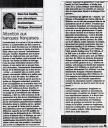 As I was trying to figure out the exact cut-off times for submitting exercise notice on options, be it early or at expiration date, I stumbled on an interesting case of profitable wildcard option exercise on Farmers Group, Inc. some 22 years ago.
As I was trying to figure out the exact cut-off times for submitting exercise notice on options, be it early or at expiration date, I stumbled on an interesting case of profitable wildcard option exercise on Farmers Group, Inc. some 22 years ago.
On Friday, the 17th of June 1988, holders of OTM put option contracts on this stock (OTM at the closing time of regular trading hours, which by then was 3:00 PM on PHLX), submitted an exercise notice at 6:00 PM, therefore bypassing the exchange cut-off time of 4:30 PM (still in effect today) but not OCC‘s of 7:00 PM (has not changed either since then though technically 6:30 PM is a safe limit, according to an OIC expert I talked to, who also mentionned that nowadays nobody can exercise after 4:30 PM on expiration Friday).
Why? Because at 6:00 PM, this very Friday, the California Insurance Department barred a takeover of Farmers Group, Inc, which caused a substantial decline in the value of the stock and changed the moneyness of formerly worthless put options.
As of 2010, exercising an officially OTM option at expiration is still possible, though the OCC no longer accepts exercise notices after 4:30 PM. If a broker imposes an earlier cut-off time, he would benefit from exercising OTM options abandoned by its customer (who no longer can decide to exercise), should the market conditions make it worthwhile. Yet they would not need to pay this profit back to their customer since the official closing price was OTM… This is not very ethical for the customer (if the latter is not allowed to submit exercise notice after 3:30 PM for example), but it would be a waste of free money not to do it.
I wonder to which extent brokers are aware of this opportunity, whether it is a common practice, and how much they can really make out of it…
Then, when we talk about early exercise of cash-settled index options, like OEX, it is possible to exercise at the closing price (determined at 3:00 PM) until 3:20 PM CST the same day, according to CBOE’s Rule 11.1, .03:
Clearing Members must follow the procedures of the Clearing Corporation when exercising American-style cash-settled index option contracts issued or to be issued in any account at the Clearing Corporation. Members must also follow the procedures set forth below with respect to American-style cash-settled index options: (a) For all contracts exercised by the member or by any customer of the member, an “Exercise Advice” must be delivered by the member in such form or manner prescribed by the Exchange to a place designated by the Exchange no later than 3:20 p.m. (CT), or if trading hours are extended or modified in the applicable option class, no later than five (5) minutes after the close of trading on that day.
According to the OIC, it is normally not possible for an OCC member to bypass the exchange’s cut-off time, though I wonder whether it can be tolerated (like in the case of Farmers Group, Inc.)…
For physically-settled options, the only closing price that matters is the one on expiration Friday. If you exercise early, you immediately become long (or short) of securities; if you want to close your position right away you will have to use the after hours fair trading price, not the artificial and outdated closing price.
On cash-settled options however, an arbitrage strategy could consist in buying a call, selling the underlying to delta-hedge, and wait for a big downward move to occur after close and before 3:20 PM. This would allow you to exercise the call at an artificially high price, buy back the underlying at a low price, and therefore book a free profit. The reverse applies when being long a put and the underlying.
If there is no big move (and there usually isn’t any), you are good to unwind your delta-hedged position, hoping the implied volatility of the option will not have made your lose some money (and it is more likely to go down than to go up, since there has been no sudden move on the underlying), in the case you would not have hedged your vega.
Note: All referenced times are CST.
 I just finished reading this very interesting paper, published in the Internet Journal of Criminology, by Dr Mike Sutton, who shows that even the most zealous urban myth busters may themselves end up committing the very crimes they are fighting against…
I just finished reading this very interesting paper, published in the Internet Journal of Criminology, by Dr Mike Sutton, who shows that even the most zealous urban myth busters may themselves end up committing the very crimes they are fighting against… 1 comment
1 comment

